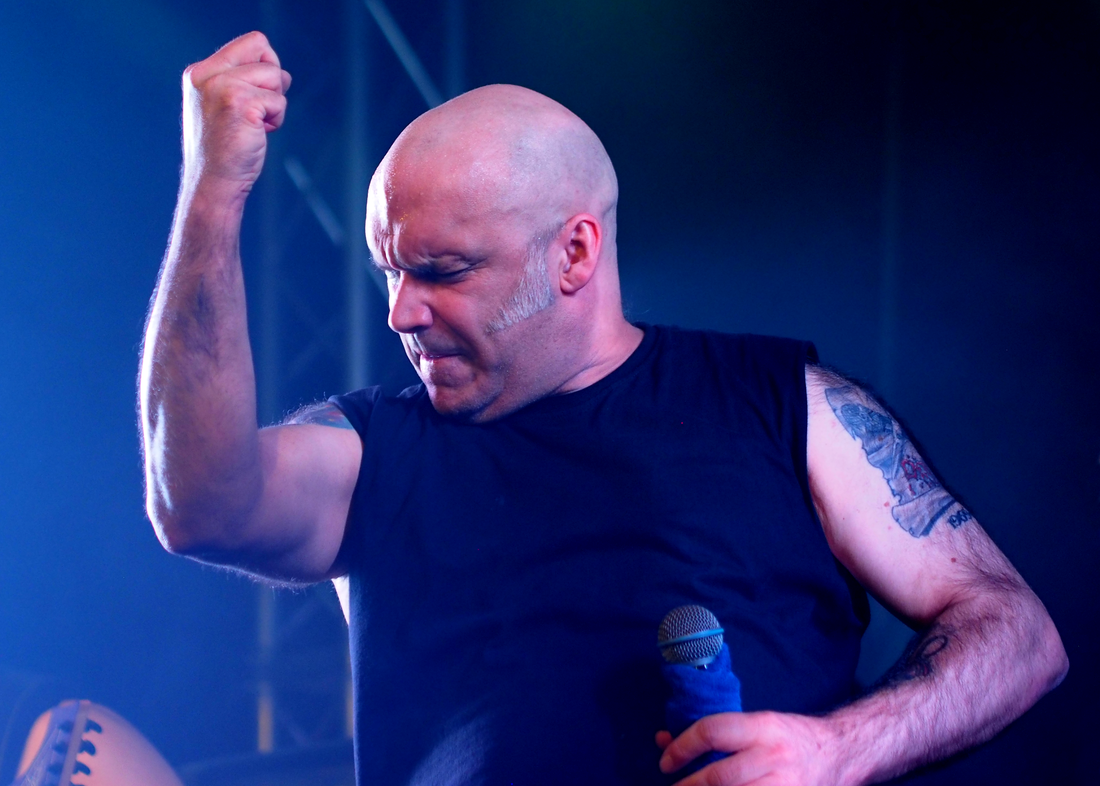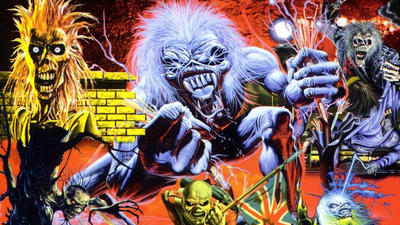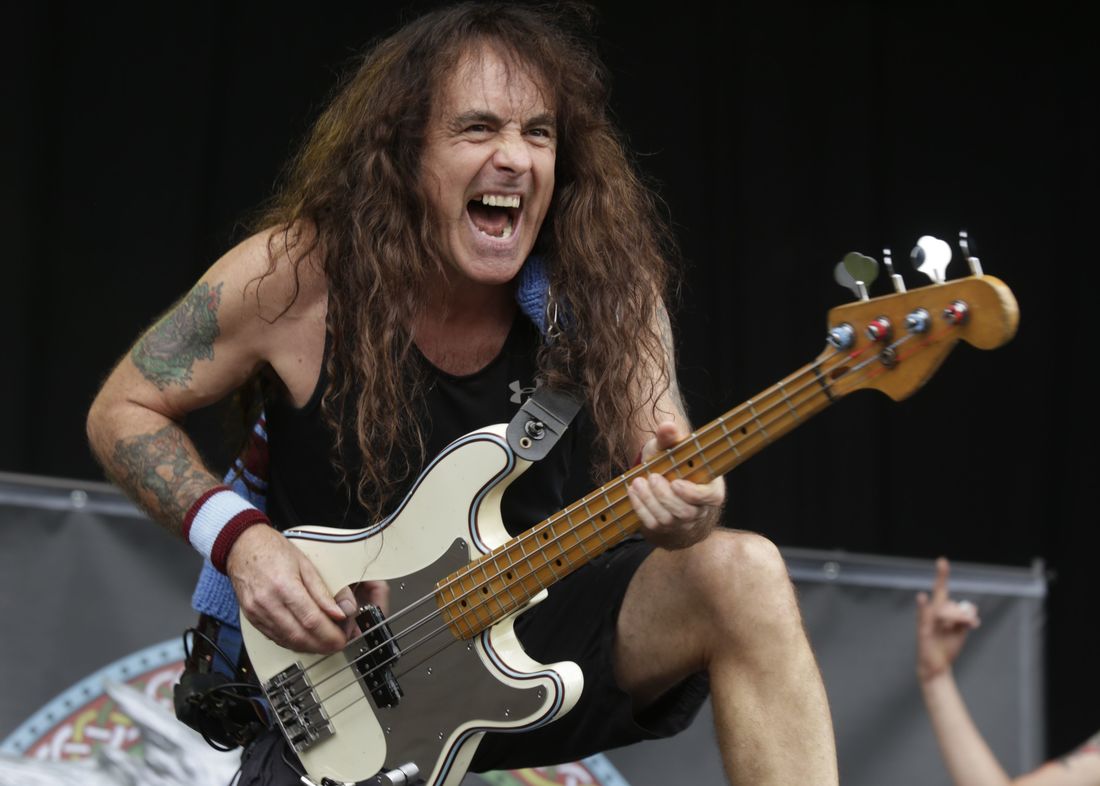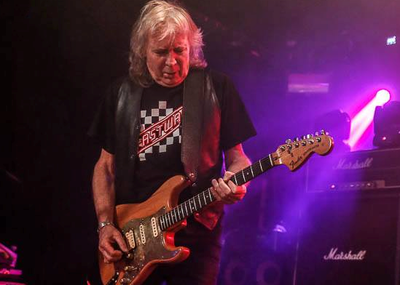|
There have been plenty of ups and downs in Blaze Bayley’s Career. The “incredible roller coaster of emotions” in joining, and ultimately parting with Iron Maiden, have been tempered by his struggles with his own mental health. He has in his own word however, the best job in the world, as a “professional heavy metal singer”, one that he thanks his loyal fan base for keeping him in. We sat down with Blaze at Burrfest in London, for an in-depth chat about his Maiden Days, Wolfsbane’s high water moments, and keeping the black dog at bay. At the temple of rock; Eamon O’Neill.
Hi Blaze, welcome to Burfest! How are you today?
I’ okay. It’s slightly stressful because it’s a very important gig for me. I have done a couple of charity things before, but this one is the real core audience. I have a lot of my own fans here who have followed me through the years. Some people only know me from Maiden, but also, there’s a lot of people who will have never seen me before, and they come to this event every year, so, it’s very important to me. I want to do my best so that I come over, and they can see what I do. You’re performing an Iron Maiden set tonight, featuring songs from your time in the band; how is that for you? It’s a little bit of pressure, but that’s pressure that I put on myself because I want to do a good job. I want to make sure that these songs come over in the right way, because the voice that I have now is different from 25 years ago when I recorded these songs, and it’s improved in many ways. My voice has more depth - a different sound - and I put the songs over in a different way. The weird thing is, there’s a deeper connection with the songs and the lyrics than I had back then when I wrote them; back then it was; “sing it in time, get them in tune”, now it’s; “how do they feel? Is the emotion of the lyric coming over? Am I really portraying what the depth of this emotion is in the lyrics?” What’s it like for you, listening back to ‘The X Factor’ and ‘Virtual XI’ now; do you hear a man with a lot of weight on his shoulders? No, it’s a normal thing. The horrible thing about recording is that the songs are so fresh, you do your best to get them right and then record them the best you can, but during the tour, it’s like the edges get rounded off. They start to feel like worn-in shows, like a comfortable pair of jeans, and you start to feel really comfortable with it. That all happens during the tour, and so you haven’t got that feeling when you record it, and I think this is why a lot of musicians – including me, and I know Steve Harris is the same because we’ve talked about it many times – enjoy the feeling of recording that live album. 25 years later, there is this deep familiarity with the songs, and I’ve more confidence than I had back then. So, it’s like meeting old friends, dusting off, and it’s very, very enjoyable when fans come and they go “I wanted to hear you sing that”, and in many times, they know they’ll never see Iron Maiden perform that song live. There are deep cuts from your time with Iron Maiden, such as the darkly majestic ‘Blood on the World’s Hands’ and ‘The Edge of Darkness’, which are under-appreciated gems. There was a depth to ‘The X Factor’, and the circumstances at the time, to many fans, your favourite singer has left your favourite band, and here’s someone that you don’t want; it’s almost like having a wicked stepmother in a way! And that’s how I felt in some ways. For some fans, they don’t want anybody here, let alone that it’s me! It could have been anybody stepping in, but we have to have Iron Maiden in the world, we must have an Iron Maiden on this planet performing, and many fans had the reaction of; “let’s see what the new singer’s like”, or; “great, there’s still an Iron Maiden concert”, so it went very well in some places. But what happened was people would give the album one spin – I know this is true of many fans at the time – and go; “no, it’s nothing like what I like, I don’t like the sound. That’s it!”, and they distanced themselves for a while, and went onto other things. Other fans stuck with it and fell in love with that album. Where did you see the greatest reactions? In some countries like Greece and Sweden, that album was the biggest selling Iron Maiden album up to that time, and we played bigger gigs in those places than Iron Maiden had ever played. In some places it was crazy. In Brazil, people really enjoyed my voice and the difference, and there was no; “oh, we wanted Bruce”, it was; “we really like Blaze, actually, we like this approach, we like what he’s doing.” ‘Virtial XI’ was a much shorter album than ‘The X Factor’ with only eight songs on it; why was that?
We just ran out of time. It was just a practical thing. By the time you try and put things in place; “around what time could we release the album if we could get it done? That would mean that we’d have to start touring then”. It’s a big band, you’re booking a year in advance, and so, suddenly the tour starts looming and you go; “you know what? We don’t have the luxury of seeing how we feel; these are the songs we have, let’s record them and let’s go”. And that is the normal situation for a lot of bands. People don’t have the luxury to go; “well, how much time do we want to spend?” We did have that luxury on ‘The X Factor’, but, I mean, it’s eight songs, and it’s still a good chunk of music; it’s still longer than ‘Reign in Blood’. The final line you sing on an Iron Maiden album is “amigos, no more tears”, at the end of ‘Como Estais Amigos’, which seems quite poignant now. Well, for me the whole experience was a wonderful, wonderful opportunity. I’m so lucky to have been in one of my favourite bands, and ‘Como Estais Amigos’, I’d never been anywhere in South America, and I was in Argentina for the first time doing a promotional tour, and I saw the memorial for the soldiers that died in the Falkland’s war. And in the UK we have memorials for our soldiers that died in that war, and there was something about it. Everybody in Argentina was so lovely, and only interested in music and talking about music, and you think; “how could we have a war with these people?!” It was just an incredible experience, and I really felt that deeply. I went and I looked and I read the names of the fallen on that tour, and I went back to the hotel and I wrote a poem about my feelings. And a year later, there we were, and I was working with Janick [Gers, Iron Maiden guitarist], and then that poem turned into the lyric for ‘Como Estais Amigos’. Steve was a big part of getting that arranged so that it made sense, and there I am with one of the biggest emotional songs in my career really. You must be particularly proud of that song. It’s a wonderful achievement for me. There is a deep melancholy within me; I’m a fighter, and I try to keep going every day and get up after every knockback, but there is a sadness and a darkness in me, and that really does come out in ‘Coma Estais Amigos’. There must be an incredible reaction when you play it in South America. Yeah, the fans in Brazil, it’s an amazing reaction, and also my fans in Argentina. The reaction is absolutely amazing, and people that served in that conflict, I’ve actually met, and they’ve come up and said; “thank you, this is an incredible song”. It’s very, very humbling, and I’m very lucky to be in that situation where I’ve been able to meet so many fans. I’ve never been interested in being ‘big’, and I’m happy in venues like this, and this is where I feel I can make that connection. What is it like for you now when you see Iron Maiden performing the songs that you originally sang, on their global ‘Legacy of the Beast’ trek?
It’s fantastic. I absolutely love Bruce Dickinson’s voice; he’s been a great supporter of me, before, during and after Iron Maiden. His voice is one of the hallmark voices of metal; that’s the epitome of what heavy metal singing is. Bruce always said that he had no problems whatsoever in singing anything from my era, and for me, what is very cool is that those two albums are obviously considered as important as other albums in the Iron Maiden catalogue. And the fact that these two huge, beautiful songs [‘The Sign of the Cross’ and ‘The Clansman’] feature in the Iron Maiden set list now, is just fantastic, and I’m so lucky to be a part of that. It must be great to see Bruce cover your songs, as you’ve covered his. I was a huge fan of Maiden before, and I loved singing those songs. There is something about it - and this is for every fan that ever sings along with a song; there is something about vocalising those songs and singing those lyrics that will give you a feeling about that song, and you will have an experience about it. That’s not unique to the person standing on the stage, that is for everybody in the audience that finds it in themselves to be able to sing along. I was overjoyed really to be able to sing those classics. You are of course, celebrating your tenure with the band with special shows in 2020. Yes, and one of the reasons that I chose ‘25’ as the number for the anniversary, is because it’s 25 years since I joined Iron Maiden. It’s not the anniversary of leaving; it’s the anniversary of joining; fulfilment of a dream; this incredible rollercoaster of emotions. It was a fantastic experience. I’m very lucky now; I’m completely independent, and I’m supported 100% by my fans. I have this wonderful trust of my fans that they support me, and for the last three albums, the very first people that heard the album were the people who bought it. That was very important to me, because what I care about is the person that’s actually given me their money and supported me; that’s the person’s opinion that counts to me. Moving on, and is there any future activity planned from Wolfsbane?
Well, we want to do it, but it’s just difficult to get us all together. There is some music written, and I’ve got to get over to Jase [Edwards], to his studio and we’ve got to jam a few things. It’s very difficult to get the four people together because we all lead such different lives. I wanted to ask you about the song ‘Dead at Last’, which closes out the ‘Down Fall the Good Guys album’. That song is a song about overcoming suicidal thoughts. That’s what it is; that’s what the lyric says. It’s done in a way that it appears fun and all of that, but it is saying that you don’t have to be trapped into a circle of thinking that means you want to take your own life; there is another way to think, there is another door, there is some way to look at it, and that’s why the name of the character is Johnny Sicuide, and that is another way to spell ‘suicide’. It’s about getting control of your thoughts and overcoming suicidal thoughts. That album begins with ‘Smashed and Blind’ which is another dark song. ‘Smashed and Blind’ is just letting out the raw anger, frustration and resentment, and bitterness of a break up. It’s letting it out; it’s the worst thing, and we’ve all felt it. Many of us have felt that way about that situation of the break up, and I didn’t hold back. The great thing in Wolfsbane is we do everything together, and we’ve always been brutally honest. We’ve never shied away from real emotions; it may not be PC, and it may not be fluffy, but it’s real, and that’s it. And in that way I think, that’s why people love what we do in Wolfsbane, because we’re never trying to hide anything away. What are your favourite albums that you’ve worked on? Well, it’s a lot of albums, but ‘All Hell’s Breaking Loose Down at Little Kathy Wilson’s Place!’ [Wolfsbane, 1990]; everything that surrounded that; the circumstances, recording it at Roundhouse Studios with [Producer] Brendan O’Brien coming over from America - he really produced the album properly, we were with him all through the song writing process. He was contributing ideas, and we were coming up with different things, and so that is just something that stands out. So many great things happened to us around that time. And from your solo years?
I think my ‘Blood and Belief’ album. In many of the songs, it’s about mental health issues that I have. I suffer from depression, I was on medication for a long time, I’ve battled suicidal thoughts, I’ve been to the psychologist, I’ve had the CBT, and I’ve managed, with a lot of help from a lot of different people, to get to a place where I’ve got control of those thoughts, and I’m actually keeping them at bay, and I’m not being a victim of them. I’m very, very lucky, and that album, really, and the way it was written; that’s another favourite. That, and ‘The Man Who Would Not Die’; it’s full of true stories about the way I was treated by the record company. I lost everything because of SPV / Steamhammer, and it was a terrible thing. Those are perhaps the standout albums for me emotionally, personally, but my greatest achievement of my career in music is my ‘Infinite Entanglement’ trilogy. It’s an epic undertaking to release three albums concurrently. This is a story about beginning, about change, then about survival and then about redemption, and this is a big story. So I said to my manager that I want to make three albums in three years, and he just looked at me! But as an artist I was totally supported, and that’s what we did. It was a lot of hard work, and we were pretty burned by the end of that third album, but as you stack them all up, it’s just amazing. I achieved what I wanted to do. I had a huge amount of help from many people, and that is the greatest achievement of my career, and all done as a totally independent artist. What’s happening for you going forward? I’m so lucky to be here living my life as a full time professional heavy metal singer. Those jobs, man, are hard to get, I can tell you! When they stop me at customs and say; “what do you do?”, I say; “I’m a professional heavy metal singer”, and they go; “have we heard of you?!”, and I go; “of course you haven’t, it’s heavy metal! Why would you have heard of me?! I’m not Michael Ball, or Justin Bieber!” [laughing] Like this interview? Like us on Facebook and follow us on Twitter for regular updates & more of the same! To Pre-Order Blaze's 'Live in Czech', click here. For all things Blaze, visit Blazebayley.net. |
|
Blaze Bayley
"Your favourite singer has left your favourite band, and here’s someone that you don’t want; it’s almost like having a wicked stepmother in a way!"
© 2016 - 2024 eonmusic.co.ukContact: [email protected]
|




